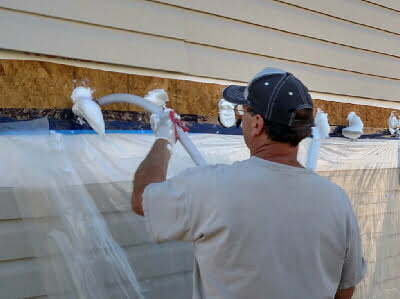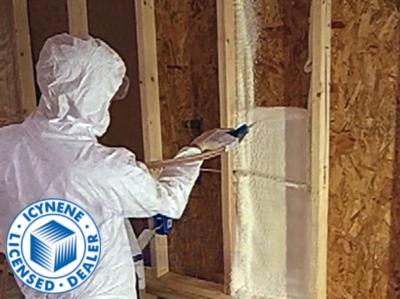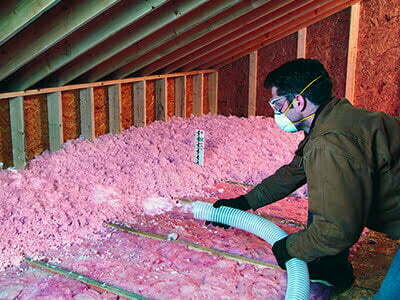From Installation to Impact: The Journey of Commercial Spray Foam Insulation
In the ever-evolving commercial construction and renovation landscape, spray foam insulation has emerged as a game-changing technology. Commercial spray foam is a high-performance insulation and air barrier material that is applied as a liquid and expands into a foam, creating an airtight seal within walls, roofs, and other spaces. This dual-action approach sets spray foam apart from traditional insulation methods, making it particularly effective for commercial applications where energy efficiency and building performance are paramount.
Keep reading to discover how commercial spray foam insulation services can revolutionize your property’s performance, slash energy costs, and create a more comfortable environment for your employees or tenants. The following sections will delve into the specific benefits, applications, and considerations that make this technology a game-changer in the commercial real estate sector.
Types of Commercial Spray Foam
There are two primary types of spray foam used in commercial applications: open-cell and closed-cell foam. Each has unique properties that make them suitable for different scenarios.
- Open-Cell Spray Foam: Open-cell foam is lighter and less dense than its closed-cell counterpart. It expands significantly during application, making it excellent for filling hard-to-reach areas. Open-cell foam is particularly effective for sound dampening and is often used in interior walls of office buildings or schools where noise reduction is a priority.
- Closed-Cell Spray Foam: Closed-cell foam is denser and offers a higher R-value per inch compared to open-cell foam. R-value measures thermal resistance, indicating how well a material insulates; the higher the R-value, the better the insulation performance. Closed-cell foam provides excellent moisture resistance and can add structural strength to walls. This type is often preferred for exterior walls, roofing applications, and areas prone to moisture, such as basements or coastal buildings.
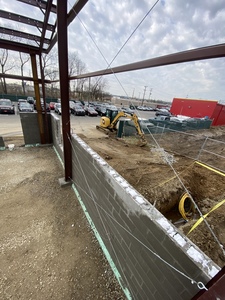
The Benefits of Commercial Spray Foam
Commercial spray foam insulation offers advantages that go well beyond traditional insulation methods. These benefits address key concerns for businesses, from operational costs to employee well-being and building longevity. Let’s explore how this innovative solution is transforming commercial properties across various dimensions.
- Energy Efficiency and Cost Savings: One of the most significant advantages of commercial spray foam is its superior ability to reduce energy consumption. By creating an airtight seal, it minimizes heat transfer and air leakage, leading to substantial savings on heating and cooling costs.
- Improved Indoor Air Quality: Spray foam’s airtight barrier prevents the infiltration of outdoor pollutants, allergens, and moisture. This contributes to a healthier indoor environment and helps maintain consistent humidity levels, reducing the risk of mold growth and improving air quality for building occupants.
- Enhanced Sound Dampening: Spray foam insulation offers excellent sound-dampening properties. It can reduce noise transmission between rooms and from the exterior, creating a quieter, more productive environment in commercial spaces.
- Structural Reinforcement: Closed-cell spray foam, in particular, can add structural integrity to a building. Applying to walls, roofs, and other surfaces creates a rigid, bonded layer that can increase the building’s resistance to wind and pressure.
- Moisture and Mold Prevention: Spray foam creates an effective barrier against moisture intrusion. This is crucial for preventing mold growth and protecting the building’s structural elements from water damage, especially in humid climates or areas prone to flooding.
Applications in Various Commercial Settings
The versatility of spray foam makes it an ideal choice for various commercial environments. Each type of business space presents unique challenges and requirements, which spray foam insulation is uniquely equipped to meet. Here’s how this adaptable solution performs across different commercial settings.
- Office Buildings: In office environments, spray foam contributes to energy efficiency and creates a comfortable, quiet workspace. It’s particularly effective in reducing noise transmission between floors and offices, enhancing privacy and productivity.
- Warehouses and Industrial Facilities: Large, open spaces like warehouses benefit greatly from this insulation’s ability to seal and insulate vast areas efficiently. It helps maintain consistent temperatures, which is crucial for inventory storage and worker comfort.
- Retail Spaces: For retail environments, spray foam helps create a comfortable shopping experience by maintaining consistent temperatures and reducing energy costs, which can impact a store’s bottom line.
- Healthcare Facilities: Hospitals and clinics require strict temperature and air quality control. Spray foam helps maintain these conditions while contributing to a quieter healing environment.
- Educational Institutions: Schools and universities can benefit from spray foam’s energy efficiency and sound dampening properties, creating conducive learning environments while managing operating costs.
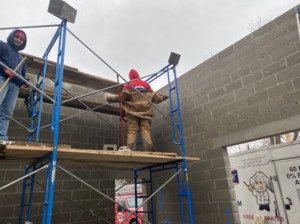
The Installation Process
The application of commercial spray foam is a sophisticated process that requires skilled professionals. It begins with thorough preparation of the site, ensuring all surfaces are clean and free from debris. Safety measures, including proper ventilation and protective equipment, are essential.
The foam is then applied using specialized equipment that mixes the components and sprays them onto the target surfaces. As the foam expands, it fills gaps and creates a seamless barrier. The curing process begins immediately, with the foam typically setting within seconds and fully curing within 24 hours.
How Spray Foam Outperforms Traditional Insulation for Commercial Businesses
When deciding on insulation for commercial spaces, not all materials are created equal. While traditional insulation methods like fiberglass and cellulose have been industry standbys for decades, spray foam insulation is rapidly gaining popularity due to its superior performance characteristics. Let’s explore why spray foam is increasingly the preferred choice for business owners and property managers looking to maximize their insulation investment.
- Superior Air Sealing: Spray foam creates an airtight barrier, simultaneously insulating and preventing air leakage. This dual action is not achievable with traditional materials, leading to better energy efficiency.
- Higher R-value per Inch: Spray foam, especially closed-cell, offers a higher R-value per inch than fiberglass or cellulose. This means better insulation performance with less material, which is crucial in space-constrained commercial settings.
- Moisture Resistance: Unlike fiberglass, which can absorb moisture and lose effectiveness, spray foam resists moisture intrusion. This protects against mold growth and maintains insulation performance over time.
- Structural Enhancement: Closed-cell spray foam can add structural strength to walls and roofs, a benefit not offered by traditional insulation materials.
- Long-term Cost Effectiveness: Spray foam’s superior performance and longevity often result in greater long-term savings through reduced energy costs and maintenance needs.
- Versatility in Application: Spray foam can more effectively insulate difficult-to-reach areas and irregular spaces than traditional materials, ensuring comprehensive coverage in complex commercial structures.
- Sound Dampening: Spray foam provides better sound insulation than traditional materials, creating quieter work environments in bustling commercial settings.
- Reduced Air Infiltration: Spray foam significantly reduces air infiltration by creating a barrier, helping maintain consistent indoor temperatures and improving HVAC system efficiency.
Commercial spray foam insulation offers unparalleled benefits in energy efficiency, comfort, and building performance. For businesses looking to reduce energy costs, improve indoor environments, and contribute to sustainability efforts, spray foam insulation is an investment worth considering. Contact Cincinnati RetroFoam today to learn how commercial spray foam can transform your property.
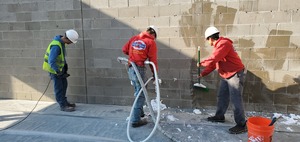
Beyond Insulation: The Cincinnati RetroFoam Commitment to Excellence
At Cincinnati RetroFoam, our mission is to provide unparalleled service and superior insulation products that help businesses and property owners achieve optimal comfort, energy efficiency, and savings. We offer a comprehensive range of insulation solutions, including our signature RetroFoam injection foam, high-performance spray foam, and efficient blown-in insulation.
As experts in commercial insulation, we bring a wealth of knowledge and experience to every project. Our team of certified professionals is dedicated to delivering top-tier insulation services that transform commercial spaces across Cincinnati and beyond. Whether it’s retrofitting existing walls with our innovative injection foam, applying spray foam for new construction, or using blown-in insulation for attics, we have the right solution for every commercial need. We take pride in our award-winning service, having received accolades for our commitment to excellence and industry growth.
At Cincinnati RetroFoam, we’re not just insulating buildings; we’re creating safer, healthier, more comfortable, and efficient spaces for businesses to thrive. With our diverse range of insulation options, we can tailor our approach to meet the unique needs of your commercial property. Let us show you the Cincinnati RetroFoam difference.
Frequently Asked Questions
How long does commercial spray foam insulation last?
Commercial spray foam typically lasts the lifetime of the building, often 50 years or more. When properly installed, it does not degrade, settle, or lose its insulating properties over time.
Is spray foam safe for commercial buildings?
Yes, spray foam is safe for commercial buildings when properly installed by professionals. Modern formulations have low VOC emissions and are designed to be safe for occupants once fully cured.
Can spray foam be applied in existing commercial buildings?
Yes, spray foam can be applied in existing commercial buildings. It’s often used in retrofit projects to improve energy efficiency. The application method may vary depending on the building’s structure and accessibility.
Types of Insulation We Install
Whether your project is an existing home, new construction, pole barn, or commercial property… we offer the best insulation options to meet your needs.
